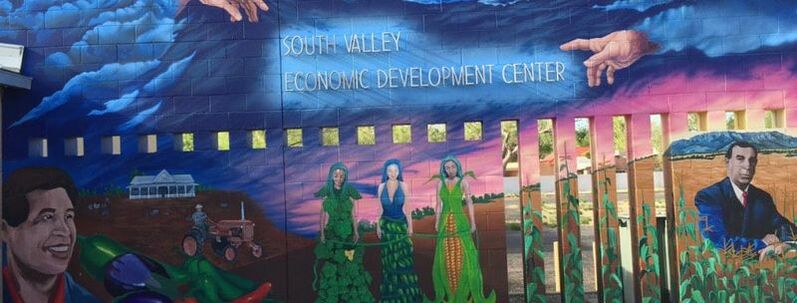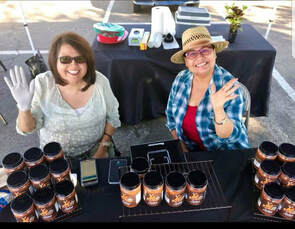
It was Earth Day on Monday! We think every day should be Earth Day, but we digress. We are striving to build an organization that is environmentally sustainable, and we thought this would be a great time to share what we’re already doing to keep our environmental impact low. What is outlined below is a good start, and we hope find other ways to reduce our impact on the planet!
Facility: Roadrunner Food Bank is kind enough to rent us warehouse, walk-in cooler, and freezer space to store our products. There is a large solar array covering the roof of Roadrunner. The solar energy that they collect powers all of their cooler and freezer space, so our food storage has an extremely low environmental impact! Additionally, any food waste that we have (~10-20 pounds per week) is composted and taken to a loca pig farm to feed the pigs. We value our partnership with an environmentally conscious organization.
Operations: We are constantly honing our systems to ensure that they are as efficient as they can be and that we have little to no waste. We transitioned from large, wasteful cardboard boxes each week to paper bags that we pack in reusable crates! Some folks bring their own reusable bag to their pickup location each week and send the paper bag back to be reused - we encourage this! We also reuse all of our swap boxes, and have seriously tried to cut back on our use of plastic bags - you may have noticed that we have stopped bagging a large percentage of our on the side produce. We are also going to start printing half-page newsletters in efforts to reduce paper waste. We’d love to hear your suggestions on how else we can work to reduce our environmental impact!
Product Sourcing: We try our hardest to source from local farmers and producers. While we aren’t able to offer 100% local produce in off-season, we use that time to develop new relationships with local producers, like Bob Thomson at Thompson Farms and Carla Gallegos from Sabor New Mexico. Sourcing locally helps to eliminate one HUGE factor that comes along with most large scale production and “big ag”: transportation. Instead of purchasing eggs from 500+ miles away, we source eggs from just 30 miles away. This helps to reduce emissions created by long-haul trucking, not to mention it supports our local economies and communities and creates resilience.
Click here to download a PDF of this week's Newsletter!
Facility: Roadrunner Food Bank is kind enough to rent us warehouse, walk-in cooler, and freezer space to store our products. There is a large solar array covering the roof of Roadrunner. The solar energy that they collect powers all of their cooler and freezer space, so our food storage has an extremely low environmental impact! Additionally, any food waste that we have (~10-20 pounds per week) is composted and taken to a loca pig farm to feed the pigs. We value our partnership with an environmentally conscious organization.
Operations: We are constantly honing our systems to ensure that they are as efficient as they can be and that we have little to no waste. We transitioned from large, wasteful cardboard boxes each week to paper bags that we pack in reusable crates! Some folks bring their own reusable bag to their pickup location each week and send the paper bag back to be reused - we encourage this! We also reuse all of our swap boxes, and have seriously tried to cut back on our use of plastic bags - you may have noticed that we have stopped bagging a large percentage of our on the side produce. We are also going to start printing half-page newsletters in efforts to reduce paper waste. We’d love to hear your suggestions on how else we can work to reduce our environmental impact!
Product Sourcing: We try our hardest to source from local farmers and producers. While we aren’t able to offer 100% local produce in off-season, we use that time to develop new relationships with local producers, like Bob Thomson at Thompson Farms and Carla Gallegos from Sabor New Mexico. Sourcing locally helps to eliminate one HUGE factor that comes along with most large scale production and “big ag”: transportation. Instead of purchasing eggs from 500+ miles away, we source eggs from just 30 miles away. This helps to reduce emissions created by long-haul trucking, not to mention it supports our local economies and communities and creates resilience.
Click here to download a PDF of this week's Newsletter!



